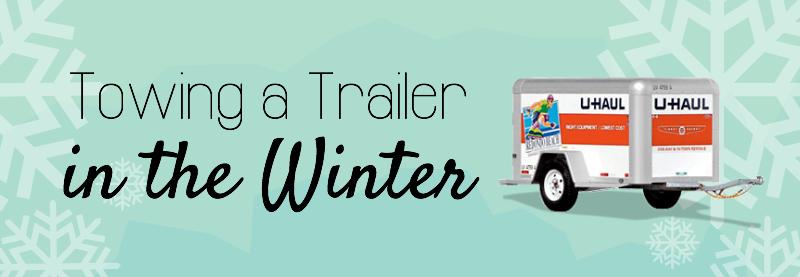Stay safe while towing a trailer in the winter with a little extra planning, preparation, and common sense. As the weather gets colder and the snow starts to fall, road safety is more important than ever to keep you, your loved ones, and everyone else on the road safe this winter.
Start with your tow vehicle
Before you head out, make sure the vehicle you’re using to tow is in good driving condition. Have your vehicle inspected to ensure all regularly scheduled maintenance has been performed, and your vehicle has been weatherized. Tell your mechanic that you are planning to tow a trailer so they can inspect the braking system, make sure your tires are in good condition, fill the tires to the proper level, and find any other issues that may prevent a safe journey. It’s always best to ask an expert for help and this is the perfect place to start. Make sure you have the proper wiring and lights for your trailer so you’re visible to other drivers and drive with your lights on at all time, even during the day.
Choose the proper trailer
If you’re traveling through an area in which rain or snow may be an issue, and you’re towing cargo that can become damaged if exposed to the elements, consider using a closed-top cargo trailer. If you’re using an open-top utility trailer, use tarps fastened with elastic straps or rope to cover and protect your items.
Practicing safe trailering
Regardless of the weather, it is critical to load your trailer heavier in the front, and lighter in the back. Place 60 percent of the weight of the items you’re towing in the front of the trailer and 40% of the weight in the back of the trailer to ensure proper weight distribution. Secure your load to prevent shifting during travel.
Plan your route
Take the road most traveled. Avoid back roads that are more likely to be missed by road clearing crew, and focus on main highways. Many states have websites that live stream video of highways for travelers to check road conditions. Make sure roads are cleared before you begin driving so you can avoid hazards before they become a problem.
Take some emergency supplies with you
Before you begin your journey, be sure to take along a couple of blankets, bottles of water, snacks and your phone charger. Know the non-emergency phone numbers of the authorities in the area in which you are traveling. Also, bring the number of your roadside assistance provider. If you have any issues, do not hesitate to ask for help.
Check the weather before you head out
To avoid driving in snow and ice check the weather before you start to drive for the day. Lifehacker.com suggests some top iPhone weather applications like Dark Sky, which provides weather forecasts for the next hour as part of their main feature so you can be sure the data is up to date. For Android users, Android Authority suggestions Accuweather, a free app that provides extended and hourly forecasts.
Slow down and plan stops sooner than normal
While towing in the winter, you may be in ideal weather conditions for most of your journey; however, rain or snow may begin to fall while you’re traveling. If this happens, slow down to a speed at which you feel safe and increase the distance between your vehicle and those in front of you. If other drivers are being aggressive and following too close, pull over to let them pass. Slow down well in advance of a stop or turn to avoid skidding on slippery roads.
Take a break
If weather, visibility and road conditions begin to worsen while you’re driving, find shelter, and even stay at a hotel to wait it out. While you may increase your travel expenses and lose some time, your safety is well worth it. Use the time to rest, check to see when the weather will improve, and resume travel when the weather improves.
Always wear your seatbelt!
Just like securing your cargo inside the trailer, protect yourself and your passengers by making sure everyone buckles up every time you hit the road.
Do you have any suggestions on ways to stay safe while towing a trailer in the winter? Please be sure to leave them in the comments section below for your fellow travelers so we can all stay safe.




